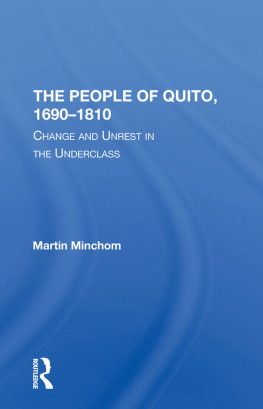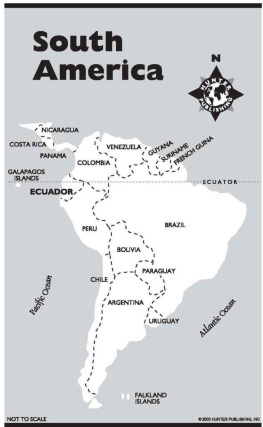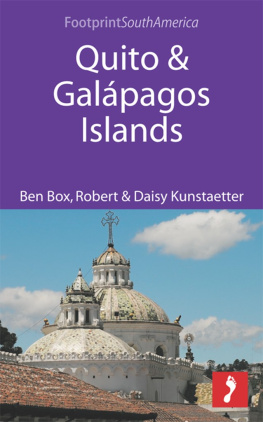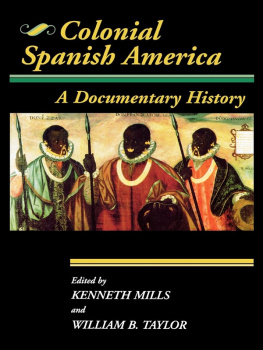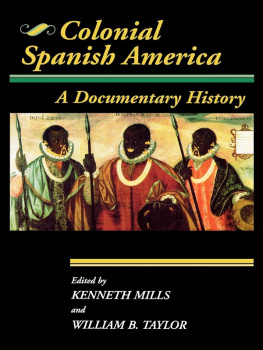THE PEOPLE OF QUITO, 1690-1810
Dellplain Latin American Studies
| No. 10 | Tierra Adentro: Senlement and Society in Colonial Durango , Michael M. Swann |
| No. 11 | Andean Reflections: Leners from Carl 0. Sauer While on a South American Trip Under a Grant from the Rockefeller Foundation, 1942 , edited by Robert C. West |
| No. 12 | Credit and Socioeconomic Change in Colonial Mexico: Loans and Mortgages in Guadalajara, 1720-1820 , Unda Greenow |
| No. 13 | Once Beneath the Forest: Prehistoric Terracing in the Rto Bee Region of the Maya Lowlands , B. L. Turner, ll |
| No. 14 | Marriage and Fertility in Chile: Demographic Turning Points in the Petorca Valley, 1840-1976 , Robert McCaa |
| No. 15 | The Spatial Organization of New Land Senlement in Latin America , Jacob O. Maos |
| No. 16 | The Anglo-Argentine Connection, 1900-1939 , Roger Gravil |
| No. 17 | Costa Rica: A Geographical Interpretation in Historical Perspective , Carolyn Hall |
| No. 18 | Household Economy and Urban Development: So Paulo , 1765-1836, Elizabeth Anne Kuznesof |
| No. 19 | Irrigation in the Baj{o Region of Colonial Mexico , Michael E. Murphy |
| No. 20 | The Cost of Conquest: Indian Decline in Honduras Under Spanish Rule , Linda Newson |
| No. 21 | Petty Capitalism in Spanish America: The Pulperos of Puebla, Mexico City, Caracas, and Buenos Aires , Jay Kinsbruner |
| No. 22 | British Merchants and Chilean Development, 1851-1886 , John Mayo |
| No. 23 | Hispanic Lands and Peoples: Selected Writings of James J. Parsons , edited by William M. Denevan |
| No. 24 | Migrants in the Mexican North: Mobility, Economy, and Society in a Colonial World , Michael M. Swann |
| No. 25 | Puebla de los Angeles, Industry and Society in a Mexican City, 1700-1850 , Guy P. C. Thomson |
| No. 26 | Generations of Senlers: Rural Households and Markets on the Costa Rican Frontier, 1850-1935 , Mario Samper |
| No. 27 | Andean Ecology: Adaptive Dynamics in Ecuador , Gregory Knapp |
| No. 28 | Disease and Death in Early Colonial Mexico: Simulating Amerindian Depopulation , Thomas Whitmore |
| No. 29 | Veracruz Merchants, 1770-1829: A Mercantile Elite in Late Bourbon and Early Independent Mexico , Jackie R. Booker |
| No. 30 | Laricollaguas: Ecology, Economy, and Demography in a Seventeenth-Century Peruvian Village , David J. Robinson |
| No. 31 | Encomienda Politics in Early ColOnial Guatemala, 1524-1544: Dividing the Spoils , Wendy Kramer |
Dellplain Latin American Studies
PUBLISHED IN COOPERATION WITH THE DEPARTMENT OF GEOGRAPHY SYRACUSE UNIVERSITY
Editor
David J. Robinson
Editorial Advisory Committee
John . Chance
Arizona State University
William M. Denevan
University of Wisconsin
John E. Kicza
Washington State University
Asuncin Lavrin
Howard University
W. George Lovell
Queen's University
Publication Design and Cartography
Marcia J. Harrington
Syracuse University
The People of Quito, 1690-1810
Change and Unrest in the Underclass
Martin Minchom
Dellplain Latin American Studies, No. 32
First published 1994 by Westview Press, Inc.
Published 2019 by Routledge
52 Vanderbilt Avenue, New York, NY 10017
2 Park Square, Milton Park, Abingdon, Oxon OX14 4RN
Routledge is an imprint of the Taylor & Francis Group, an informa business
Copyright 1994 by the Department of Geography, Syracuse University
All rights reserved. No part of this book may be reprinted or reproduced or utilised in any form or by any electronic, mechanical, or other means, now known or hereafter invented, including photocopying and recording, or in any information storage or retrieval system, without permission in writing from the publishers.
Notice:
Product or corporate names may be trademarks or registered trademarks, and are used only for identification and explanation without intent to infringe.
A CIP catalog record for this book is available from the Library of Congress.
ISBN 13: 978-0-367-29471-7 (hbk)
- AA/C Archivo Arzobispal, Cuenca
- AA/L Archivo Arzobispal, Lima
- ACM/Q Archivo de la Curia Metropolitana, Quito
- AF/Q Archivo Franciscano, Quito
- AGI Archivo General de Indias, Seville
- Quito Section Audiencia de Quito
- AGN/L Archivo General de la Nacin, Lima
- AHBC/I Archivo Histrico del Banco Central, Ibarra
- AHBC/Q Archivo Histrico del Banco Central, Quito
- AHN/M Archivo Histrico Nacional, Madrid
- AM/Q Archivo Municipal, Quito
- LCQ Libros de Cabildo
- ANC/B Archivo Nacional de Colombia, Bogot
- ANH/Q Archivo Nacional de Historia, Quito
- Carn. y Pulp. Section Carniceras y Pulperas
- Ind. Section Indgenas
- Mz. Section Mestizos
- Not. Notarial Register
- Pres. Section Presidencia de Quito
- Reb. Section Rebeliones
- ANH/C Archivo Nacional de Historia, Azuay (Cuenca)
- AP/Q Parish Archives, Quito
- BL British Library, Department of Manuscripts, London
- BN/Bogot Biblioteca Nacional de Colombia, Santaf de Bogot
- BN/M Biblioteca Nacional, Madrid
- BNP/L Biblioteca Nacional del Per, Lima
- GS F. Gonzlez Surez, Historia General de la Repblica del Ecuador 3 vols., Quito, 1969-70
- HAHR Hispanic American Historical Review
- LCQ Libro de cabildo, published by the Municipality of Quito
- RGI Relaciones Geogrficas de Indias: Per, (ed.) M. Jimnez de la Espada, 3 vols., Madrid, 1965
In writing The People of Quito I wished to break away from the established pattern of regional studies of colonial Spanish America (still largely polarized between White elites and the Indian peasantry) with a study of the social history of colonial Quito rooted in the experience of its lower strata. Although my use of the term "people" (perhaps influenced by European studies such as Daniel Roche's Le Peuple de Paris ) was therefore primarily intended to evoke non-elite social groups, the book was given a broadly based form so as to be able to contribute to our understanding of Quiteo society as a whole.
Its geographical scope is that of urban Quito, a vertical terrain hemmed in by mountains and divided by ravines, which proved to have played its own hidden role in shaping the city's social geography. I have tried to take account of the urban center's close interaction with its rural hinterland, and place this evidence in the broader context of the Audiencia of Quito (the administrative forerunner of the modern Republic of Ecuador). One of the corollaries of my use of "Braudelian time" (combining the study of geographical factors, long-term structural change and vnementielle history) is that the dates in the title are essentially there as a flag of convenience; the continuities and structural features of Quito society call, I think, for long-term comparative analysis. As for the subtitle "Change and Unrest in the Underclass," this was not intended to provide an exhaustive description of the contents, but rather to highlight the dynamic dimension of the tensions generated by economic change and Bourbon fiscal reform in the late-colonial period.

